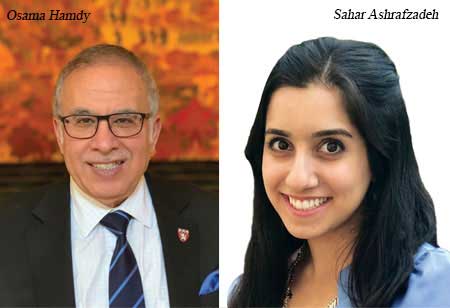One of the greatest challenges in
diabetes care is engaging patients in their disease self-management. Mobile health technologies have been shown to mitigate this challenge. Over the last decade, smart phones and tablets provided unique tools to increase patient-provider interaction and patient engagement in their healthcare through text messaging, telehealth consultations with healthcare providers, comprehensive smartphone applications, and wireless Bluetooth syncing with medical devices.
Many medical conditions improve when patients actively engage in disease management outside of the clinic, with diabetes being the low hanging fruit. According to the Centers for Disease Control and Prevention (CDC), 30 million people in the United States have either type 1 (T1D) or type 2 diabetes (T2D). Another 84 million Americans have pre-diabetes, a condition which eventually may lead to T2D in the absence of a lifestyle intervention. With roughly a third of the nation’s population having this chronic disease or at risk of developing it, we need to re-evaluate our existing care model not only to empower patients to be more involved in monitoring their health and more dynamic in decision making of their healthcare, but ultimately to provide more efficient scalable interventions at a population level.
Diabetes Management
Diabetes management is complex and can be onerous. Patients need to be physically active and exercise regularly, choose healthy foods that have minimal impact on their blood glucose, and keep track of numerous medications and insulin regimens to improve adherence to treatment plans. They also need to regularly measure blood glucose levels throughout the day and make frequent physician appointments to monitor long-term complications such as retinopathy, nephropathy, neuropathy, and cardiovascular disease. It comes as no surprise that patients trying to control their diabetes often experience emotional and mental “burnout” which can lead to poorer health outcomes with adherence at 50-70 percent.
One of the major inefficiencies in diabetes care is rooted in the reality that doctors have too little time to focus on lifestyle management strategies for patients when seeing a growing patient population. Over 50 percent of diabetes-related healthcare spending is due to downstream complications of diabetes, many of which can be prevented if better lifestyle interventions are implemented early on.
In particular, helping overweight and obese patients with diabetes lose weight is a highly effective strategy for diabetes management. While the CDC estimates that over 85 percent of people with diabetes are overweight or obese, losing weight can lead to better blood glucose control, delayed or prevented complications, and even diabetes reversal with partial or complete remission. Mobile phones can be conveniently used for helping patients make healthier lifestyle choices throughout the day and empowering them to lose weight.
Mobile Health
Mobile health (m-health) is defined as the use of mobile devices and wireless technologies to deliver health and metabolic information to patients. While Bluetooth-enabled continuous glucose monitors and insulin pumps are used by some patients with diabetes, nearly everyone uses mobile phones in their everyday life. At the most basic level, cell phones can be used for patients and providers to communicate with each other through texting. Studies have found that text message reminders sent to patients about prescription instructions and diabetes management goals set in the clinic lead to greater medication compliance and better adherence to treatment plans.
In contrast to the typical longer clinic visits, with mobile health, patients can be engaged better through shorter, more frequent interactions with their physicians
Smartphone applications enable more comprehensive interventions. Patients can track their dietary intake and sync physical activity data from a fitness tracker to a mobile phone application to help them lose weight. They can also upload or sync blood sugar measurements onto a smartphone app in order to visualize trends in their blood sugar levels and to send data directly to their healthcare providers. When adjustments to their treatment plans are needed, patients may choose to schedule virtual telemedicine appointments with physicians and diabetes educators, saving them money and time that otherwise would be spent traveling to the doctor’s office, parking, and sitting in the waiting room. Numerous recent meta-analyses have demonstrated that m-health and telemedicine not only engage patients in their diabetes self-management but also lead to better blood glucose control and weight loss outcomes than usual medical care. In contrast to the typical longer clinic visits, patients can be engaged better through shorter, more frequent interactions with their physicians. Greater frequency of visits was also shown to improve glycemic control within a shorter period.
Data-Driven Care
One particularly promising aspect of m-health is its ability to use data gathered from patients to make diabetes management more personalized and effective. Smartphone applications can use machine learning to identify times of the day when a patient is at high risk of making poor dietary choices and unhealthy decisions, and they can notify the patient of alternative food and activity options. They can also correlate specific foods and exercises with blood glucose trends and use predictive analytics to create patient-specific dietary and physical activity recommendations for further improving blood sugar control. These personalized recommendations not only help with patients’ self-management but also enable physicians to make better informed treatment decisions.
When widely used by patients, diabetes smartphone applications can collect a wealth of lifestyle behavior and clinical data from people around the world. Large-scale, longitudinal patient health data will become increasingly available when collected through m-health smartphone applications, helping us understand diabetes trends across a population. This data is great firewood for developing efficient predictive models through artificial intelligence. For example, which foods lead to better diabetes control? Which medications work best for population subgroups? Answers to these questions will inform better clinical practices and lifestyle interventions for patients.
Check This Out: Top Diabetes Care Companies 


